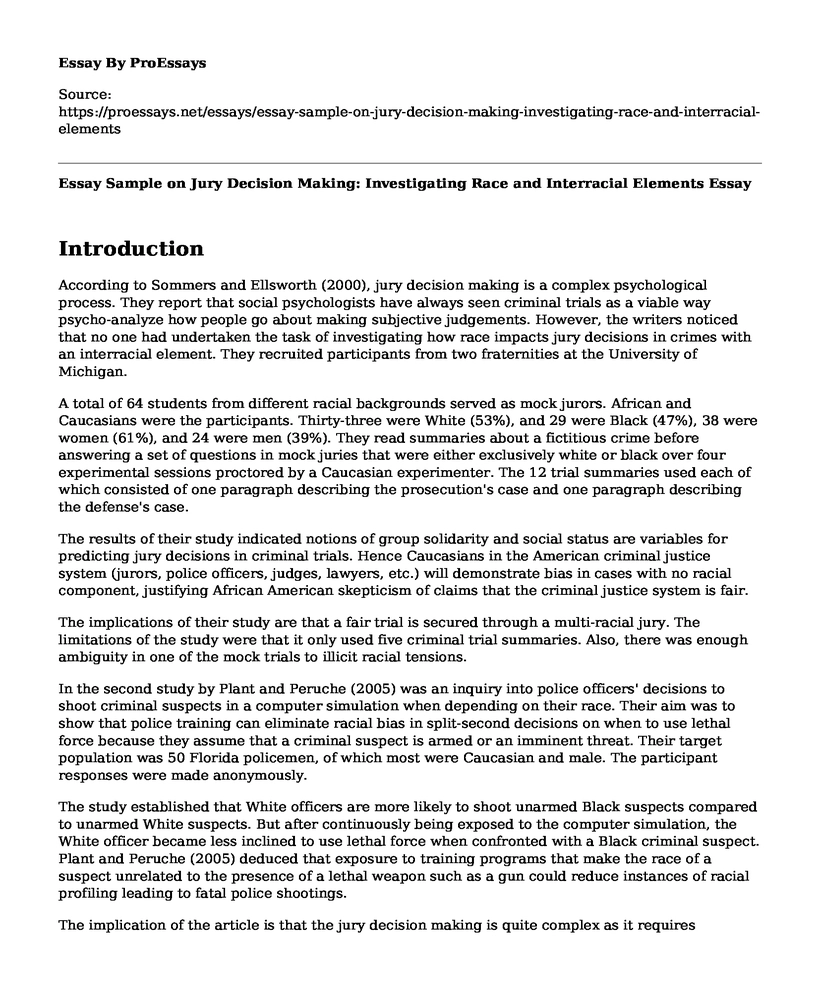Introduction
According to Sommers and Ellsworth (2000), jury decision making is a complex psychological process. They report that social psychologists have always seen criminal trials as a viable way psycho-analyze how people go about making subjective judgements. However, the writers noticed that no one had undertaken the task of investigating how race impacts jury decisions in crimes with an interracial element. They recruited participants from two fraternities at the University of Michigan.
A total of 64 students from different racial backgrounds served as mock jurors. African and Caucasians were the participants. Thirty-three were White (53%), and 29 were Black (47%), 38 were women (61%), and 24 were men (39%). They read summaries about a fictitious crime before answering a set of questions in mock juries that were either exclusively white or black over four experimental sessions proctored by a Caucasian experimenter. The 12 trial summaries used each of which consisted of one paragraph describing the prosecution's case and one paragraph describing the defense's case.
The results of their study indicated notions of group solidarity and social status are variables for predicting jury decisions in criminal trials. Hence Caucasians in the American criminal justice system (jurors, police officers, judges, lawyers, etc.) will demonstrate bias in cases with no racial component, justifying African American skepticism of claims that the criminal justice system is fair.
The implications of their study are that a fair trial is secured through a multi-racial jury. The limitations of the study were that it only used five criminal trial summaries. Also, there was enough ambiguity in one of the mock trials to illicit racial tensions.
In the second study by Plant and Peruche (2005) was an inquiry into police officers' decisions to shoot criminal suspects in a computer simulation when depending on their race. Their aim was to show that police training can eliminate racial bias in split-second decisions on when to use lethal force because they assume that a criminal suspect is armed or an imminent threat. Their target population was 50 Florida policemen, of which most were Caucasian and male. The participant responses were made anonymously.
The study established that White officers are more likely to shoot unarmed Black suspects compared to unarmed White suspects. But after continuously being exposed to the computer simulation, the White officer became less inclined to use lethal force when confronted with a Black criminal suspect. Plant and Peruche (2005) deduced that exposure to training programs that make the race of a suspect unrelated to the presence of a lethal weapon such as a gun could reduce instances of racial profiling leading to fatal police shootings.
The implication of the article is that the jury decision making is quite complex as it requires psychological processes where the jurors need to attend to information, evaluate theories and resolve the inconsistencies. The courtroom is a fruitful venue for decision making and race should be considered in terms of its societal importance.
The limitation of their study is that no evidence exists that the elimination of bias in lethal responses using computer simulations eliminates racial bias in other decisions in the field officers have to make on a daily basis. Furthermore, their simulation did not encompass all the scenarios different branches of a police force train for. Plant and Peruche (2005) recommend that other studies in the same vein should investigate this limitation in their research.
References
Sommers, S. R., & Ellsworth, P. C. (2000). Race in the courtroom: Perceptions of guilt and dispositional attributions. Personality and Social Psychology Bulletin, 26(11), 1367-1379.
Plant, E. A., & Peruche, B. M. (2005). The consequences of the race for police officers' responses to criminal suspects. Psychological Science, 16(3), 180-183.
Cite this page
Essay Sample on Jury Decision Making: Investigating Race and Interracial Elements. (2023, Apr 08). Retrieved from https://proessays.net/essays/essay-sample-on-jury-decision-making-investigating-race-and-interracial-elements
If you are the original author of this essay and no longer wish to have it published on the ProEssays website, please click below to request its removal:
- Influence of Civil and Criminal Laws and the Criminal Justice System
- A Uniform Crime Report
- Assassination of Martin Luther King Jr Essay
- Child Witnesses in Criminal Proceedings: Key Considerations for Valid Evidence - Essay Sample
- Reforming US Prisons: A Debate Among Leaders and Criminal Law Researchers - Essay Sample
- Essay Example on Patients' Rights in Medical Care: A Must-Follow
- Essay Sample on Labelling Theory: Racism & Criminal Justice System







